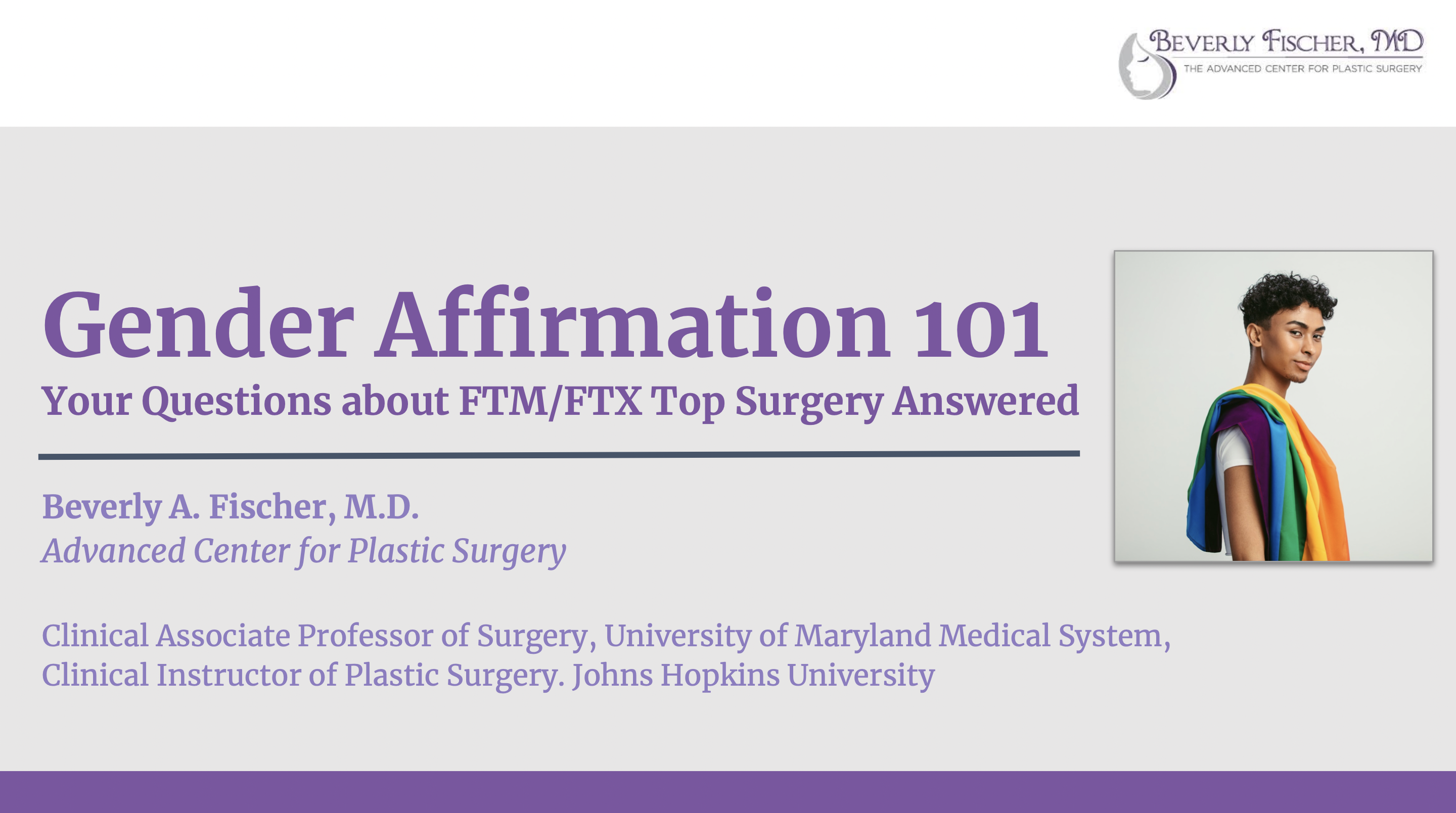
Frequently Asked Questions About Gender Affirmation
By Beverly Fischer on October 14, 2021
Gender Affirmation Back to Blog
Back to Blog


When you or someone you love is considering gender-affirming top surgery, it’s normal to have a lot of questions. Here are some of the most common FAQs for our office.
- What is the importance of gender affirmation surgery?
- What are the requirements to receive gender affirmation surgery?
- How many years of plastic surgery experience does Dr. Fischer have?
- Do I have to live in the Maryland area to get the procedure done?
- How does paying for procedures at ACPS work?
- Am I able to opt for a double incision even if I am a candidate for keyhole surgery?
- How long is the surgery?
- Will I have nipple sensation after top surgery?
- What would you recommend telling an employer to preserve privacy?
{{cta(‘8beee81c-73ae-47c0-8a9f-1481a1e6cbd9′,’justifycenter’)}}
What is the importance of gender affirmative surgery?
If you aren’t transgender, genderqueer, or nonbinary, it may be hard to understand why your loved one wants top surgery so badly. The most important thing for you to know is that it supports their mental, emotional, and even physical health in very real ways.
For example, trans men who bind their chests run physical risks including skin irritation, back pain, and shoulder pain. Living with gender dysphoria (the feeling that one’s body doesn’t match one’s gender) can bring about depression, anxiety, and other mental health struggles.
There’s now a lot of peer-reviewed medical research showing that top surgery is medically necessary and has proven benefits for those who undergo it, including improved mental health, a feeling of comfort in one’s body, and an overall better quality of life.
What are the requirements to receive gender affirmation surgery?
The World Professional Association for Transgender Health (WPATH) has defined a set of standards of care that include guidelines for gender affirmation surgery, which our office follows.
They include:
- The patient must have a support system in place
- The patient must be mentally stable, able to make an informed decision and to consent to the procedure, with a letter of support from a mental health professional
- The patient must understand the procedure is irreversible
- The patient must be diagnosed with gender incongruence
- The patient understands this is the next step in their transition
You’ll also need to be medically cleared for surgery with your primary care physician, which includes bloodwork and a full history and physical.
If you’re under 18, you can still have surgery with your parents’ or legal guardians’ consent.
How many years of plastic surgery experience does Dr. Fischer have?
She’s been performing plastic surgery for over 20 years, and has been doing gender affirmative top surgeries for 17– in fact, she was the first surgeon to specialize in gender affirmation surgery on the East Coast.
Do I have to live in the Maryland area to get the procedure done?
No, you can live anywhere in the country. In fact, it’s fairly common for transgender or nonbinary patients to travel in order to have top surgery with the plastic surgeon of their choice.
How does paying for procedures at the Advanced Center for Plastic Surgery work?
We’re happy to talk with our patients to find a payment plan that works for them. Because many insurance companies still don’t cover top surgery, we don’t have insurance options. However, we accept CareCredit, which is a form of financing specifically for medical procedures, and suggest it as an option for patients who wish to pay over time rather than all at once.
Am I able to opt for a double incision even if I am a candidate for keyhole surgery?
The type of surgery Dr. Fischer will recommend for you depends mostly on the size of your breasts prior to your reduction. A double incision is usually reserved for breasts that are larger and have more tissue to remove (graded as a 3 or a 4 in size). If your breasts are graded at 2b, however, you might have a choice between the types. During your consultation, you should discuss things like nipple sensation, scarring, and the “after” look that you’re seeking. It may not be possible to achieve your goals with one type of surgery, and we’re happy to explain why another type would be better for you.
How long is the surgery?
If you’re having a bilateral subcutaneous mastectomy (sometimes called FTM/FTX or chest masculinization), expect it to take 2 to 2.5 hours as an outpatient procedure performed in our facility, with another hour in our recovery room before you can go home. If you’re having a breast augmentation (sometimes called MTF/MTX when it’s performed for gender affirmation), it will be a shorter surgery of 1 to 1.5 hours.
Will I have nipple sensation after top surgery?
That depends a lot on the type of surgery you have. For breast implants (MTF/MTX) or periareolar mastectomy (FTM/FTX) where the nipple stalk isn’t severed, you may or may not have the same level of sensation post-procedure as you had before your top surgery. For double incision (FTM/FTX), where the nipple stalk is severed and the nipple is grafted into a new location, there can be a loss of sensation or change in the level of sensation– some patients do report regaining sensation after the healing process, and others don’t.
What would you recommend telling an employer to preserve privacy?
You don’t have to tell your employer anything other than that you’re having surgery and need to arrange time off– and they can’t ask you for any details! Your HR representative, if you have one, should take measures to protect your confidentiality, including separately storing records about your medical leave.
Because your employer must also legally make reasonable accommodations for your medical needs post-surgery (for example, not requiring you to lift heavy objects during your recovery when lifting isn’t allowed), you should make sure you understand what you might need to ask for and how you can protect your privacy when asking for it. (Side note: Your employer can refuse your accommodation requests if it creates an “undue burden” on them, but you should still ask.) You might be asked to provide a doctor’s note or some other documentation to back up your request, so make sure your doctor knows how much or little you’re disclosing at work about your surgery.
Do you still have more questions? Please check out our blog and webinar on Gender Affirmation 101, or reach out to us at 410-308-4700 or on our contact page and we’ll be happy to talk through any of your questions or concerns.
{{cta(‘eb123d9f-402a-413d-a2cf-6b258fd2b409’)}}
Dr. Beverly A. Fischer is passionate about her role as a leading female plastic and cosmetic surgeon in Baltimore, Maryland and beyond. She believes that plastic surgery makes a positive, life-changing difference, whether you’re renewing your body, face, and skin or embarking on an entire gender transition.
Reach out
We are happy to answer any questions you have. Use the form to request a consultation or more information about specific services. A member of our team will will contact you shortly.
Contact Us



